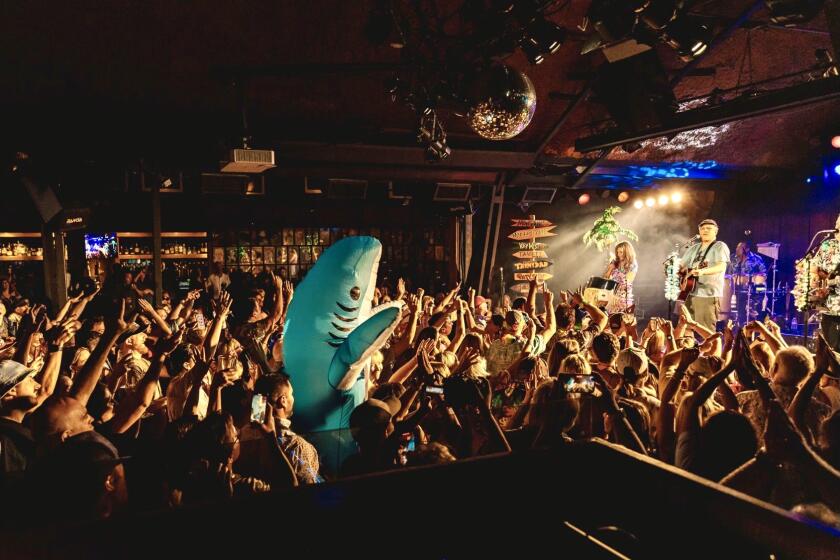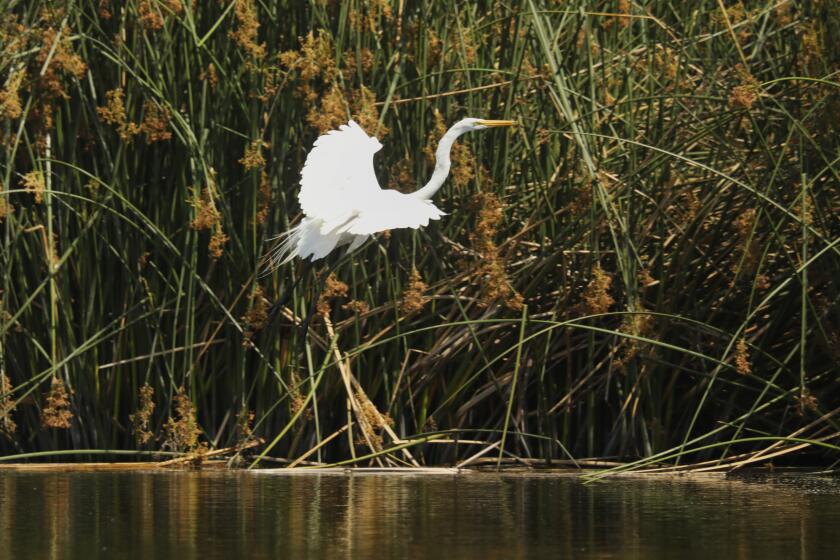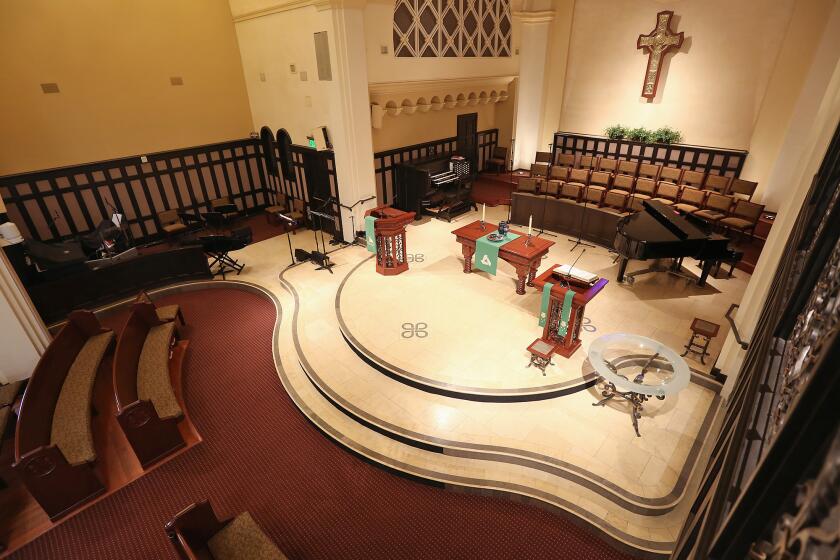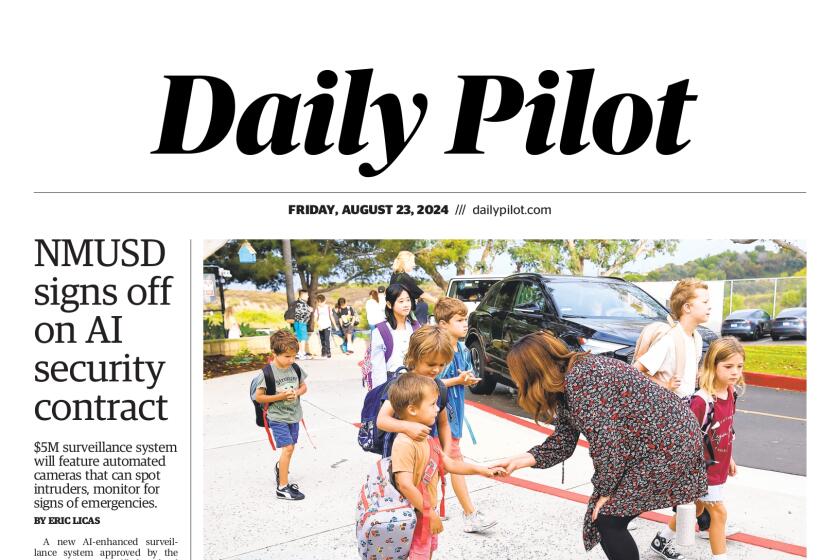Making a splash with Fish Fry’s return
Two years ago, it seemed the Fish Fry was fried. And to everyone, in
2001 and 2002, it was. But several months ago, organizers announced
that a scaled-down version of the Fish Fry fund-raiser for May 31 and
June 1 at Lions Park.
After 57 consecutive Fish Fry events at Lions Park and Orange
Coast College, organizers have dubbed this year’s Fry “One in a row,”
revealing just how pleased they are to get the old tradition back on
its tail after a lawsuit had it floating on its back.
There are no plans to revive the parade down Newport Boulevard
that was once televised on KTLA-TV Channel 5. But the fried Icelandic
cod that gives the event its name will return.
On Thursday, City Editor James Meier visited Rollo McClellan’s
Costa Mesa home to talk to the Lions Club member who participated in
the previous 57 Fish Fries. On hand were Lions Club President Mike
Scheafer, who is seeking a Costa Mesa City Council appointment, and
club member Chuck Cassity.
How did the Fish Fry come about back in 1946?
McClellan: Well, it came about through a guy by the name of Bob
Skiles, really. He joined our club about the year the Fish Fry
started. He was an entertainer. He and his wife went around to
different high schools and played piano and told jokes and the whole
bit. And he also had these old stands, and he’s the one who got this
thing going.
And they were cooking fish down there in Newport for free. They’d
have a fish fry down there at the Dory fishermen. So Heinz Kaiser
[past Lions Club president and a former county supervisor] said,
“We’ll come up here and cook the fish.”
What are your earliest memories on the Fish Fry?
McClellan: Well, getting it organized, I was a little skeptical of
what was going to happen. In fact, I asked the president of the club,
Howard Gerrish, “What’s this guy going to get out of the club.” He
says, “Well, if you don’t have nothing, you can’t get nothing.” I
said, “That’s a good answer” [laughing].
So we were skeptical of him. But then it got bigger and bigger.
The next year, it was Les Miller; he was president. We called him Mr.
Fish Fry because he worked on this thing real hard and kept going.
What are your fondest memories of the Fish Fry?
McClellan: The getting together and the satisfaction of doing
something for the community.
Mike Scheafer: I think the highlight of the event is seeing old
friends, guys he went to school with.
Chuck Cassity: Like a reunion.
Scheafer: It’s like a reunion.
McClellan: The Fish Fry started there in front of Mayfield’s on
Newport Boulevard [where Mainly Seconds is now] and we used the
American Legion Hall kind of like a kitchen and then we brought the
stuff into the park. But we could never put the carnival in the park
because it had to stay on the road. So it stayed on the road until
the city became a city, and then we got it into the park.
Tell me about hamburger flipping you did.
McClellan: Well, we had this guy named Harry Hilliard. He was an
old carny man down in Long Beach. He made his living selling 10-cent
hamburgers, so we’d give him a pound and we had about 10 to 12
hamburgers a pound. He’d use an ice cream scoop and he’d put it down
there and then hit them with a spatula. He’d have a huge pile. And he
had this other guy named Mac, this professional chef who’d put on a
show for everybody.
So we got bigger and bigger, and when we went to the manufactured
hamburgers, old Harry quit us [laughing].
So that’s how the hamburger stand got started. Then we got two
hamburger stands going. First we called it North and South. We had a
competition to see who sold the most hamburgers. And they’d mix the
North and South together, and I was in the North, so I thought we
were getting the short end of thing.
So then we changed the names to Big Al and Big Rollo.
Scheafer: Rollo can probably expand on this, but in the early
days, they had a game where you could win a duck. They had live ducks
in a tank of water ... .
McClellan: And you’d throw a ring on the duck and then you’d get
the duck.
Scheafer: The gaming people came in and shut that one down.
How much different is it going to be this year?
McClellan: It’s going to be a little smaller. When they took away
our sheds, our equipment, we were shut down.
Scheafer: When we moved out of Lions Park over to Orange Coast
College, we lost all of our booths, so we went to rental booths and
it worked fine, but we just want to get our toe back in. We’ll have a
few carnival rides, a lot of community booths and our fish dinner.
We’re having our secret batter made. It’s a secret batter, so we have
a guy on notice who’s starting the batter. Today, we’re ordering
about a thousand pounds of fish.
What do you look forward to most about the return of the Fish Fry?
Scheafer: This old fool has pushed me harder than anybody else to
do this. The community needs this. There is no other single event
other than the Orange County Fair this city does as a city. And the
fair is not ours. It’s the state’s.
McClellan: And they always have something going on at the fair.
This way, it’s one event in one park here. Other service clubs have
tried theirs and this is it.
Cassity: This was, at one time, the largest Lions Club event in
the world. This is a famous club. There are thousands of Lions Clubs
all over the world.
Scheafer: I’ve held international office, and people all over the
world say, “Is your Lions Club the one that did the Fish Fry?”
Because we’re known as the Fish Fry Club.
McClellan: Each time a guy was president, he’d try to do it just a
little better. So each new guy’s job was to see if he could do it
just a little better.
Scheafer: My father was president [of the Lions Club] in 1976, and
at that time, Gerald Ford was president [of the United States] and
the club had arranged for Mr. and Mrs. Ford to fly into the Fish Fry
to make a presentation on the stage. I was working with my dad at the
time. And I remember the Secret Service came into the park, and you
knew they were Secret Service because they all had sunglasses and
they all kept talking into their coats. And my mom was sweating
bullets because she was going to make a presentation and meet Gerald
and Betty Ford.
So, we’re getting ready to make the presentation and, all of a
sudden, the Secret Service guys got in their cars and took off.
Nobody said anything, they just took off. So my dad tried to figure
out what was going on.
Years later, we found out that they were on their way in the
helicopter to Costa Mesa. Betty Ford, a recovering alcoholic, instead
of coming to Costa Mesa, they took the helicopter to the naval
hospital in Long Beach. And that’s when she started her
rehabilitation. My mom was relieved because she didn’t have to get in
front of all of those people. My dad was ticked off because the
president didn’t come.
You’re the longest continuously active member of the Costa
Mesa-Newport Harbor Lions Club. What keeps you involved?
McClellan: [With a laugh] Just being alive. No, I enjoy doing
this. I have a lot of friends. All of my friends are in the Lions
Club.
Scheafer: We’re not going to let him die and we’re not going to
let him quit the Lions Club because -- he’s not going to like us
saying this -- as a little bit of a younger person, you look up to
people, you look up to role models and you look up to people who have
done things and never asked for retribution or repayment. The epitome
of that sits right next to you.
This man has done more for people and more for the community, and
no one’s ever heard of Rollo McClellan except for those of us who
know him and love him. That’s what keeps him with us. He tries to
leave, we’ll hunt him down.
All the latest on Orange County from Orange County.
Get our free TimesOC newsletter.
You may occasionally receive promotional content from the Daily Pilot.



